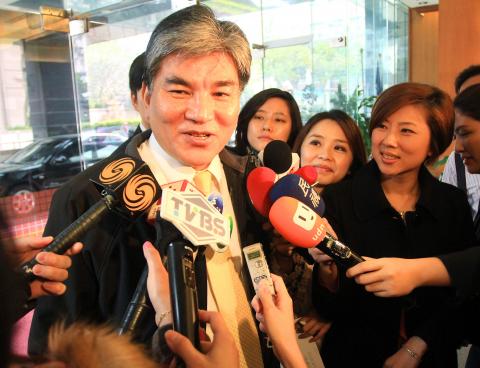Minister of the Interior (MOI) Lee Hong-yuan (李鴻源) was forced to leave the Cabinet after declining an offer by Premier Jiang Yi-huah (江宜樺) to transfer to the position of a minister without portfolio.
Jiang asked Lee to decide whether he would accept the office by midnight on Tuesday, but Lee insisted on returning to academia if he was not allowed to stay on as interior minister.
Executive Yuan Secretary-General Chen Wei-zen (陳威仁) was appointed to succeed Lee, the Executive Yuan said.

Photo: Wang Yi-sung, Taipei Times
Lee, who has enjoyed a much higher approval rating than most Cabinet officials, denied that there has been tension between him and Jiang over the past months because of disagreements on various issues, as widely reported in the media.
However, “there had been differences in opinion,” Lee said during a brief press conference in the lobby of the ministry’s building.
“I wanted to finish the projects I’ve started at the ministry, and thought about resigning from my teaching post, but apparently my boss had different considerations,” Lee told reporters.
Executive Yuan spokesperson Sun Lih-chyun (孫立群) said late on Tuesday that Lee had mentioned to Jiang last week that he had to make a decision on whether he would return to his teaching post at National Taiwan University (NTU) in Taipei or resign by the end of the month.
“Lee said that he would resign from the teaching post if the government wanted him to continue to serve as interior minister,” Sun said.
After discussing the matter with President Ma Ying-jeou (馬英九), Jiang asked Lee if he would like to become a minister without portfolio instead.
Lee turned down the offer, saying that if he could not continue to serve as the interior minister he would rather return to teaching, Sun said.
Jiang told Lee that he could call at any time before midnight on Tuesday if he changed his mind.
Lee did not make that call.
There has long been speculation that Jiang and Lee were not on good terms.
Asked why he turned down the position of minister without portfolio, Lee said his objectives since he took over as the interior minister have always been completing national spatial planning and nationwide disaster prevention projects, “and those are the only things I want to do.”
Lee said that he would return to the NTU as a professor and would not consider running in the upcoming local elections.
The Presidential Office yesterday denied that Ma had met with Jiang on Tuesday to discuss the reshuffle, expressing regret over what it called groundless news reports.
Amid reports about Lee’s problematic relationship with Jiang over his resignation and the Cabinet reshuffle, Taipei Mayor Hau Lung-bin (郝龍斌) yesterday confirmed that he met with Ma to discuss the ministry’s failure to appropriate funding for construction of the athlete’s village for the Summer Universiade, and this has delayed the preparatory work on the international sports event the city is scheduled to host in 2017.
People First Party (PFP) Chairman James Soong (宋楚瑜) said that it was a shame Lee was forced to resign because he was someone with exceptional talent who was not afraid to speak his mind and get things done.
Additional reporting by Jake Chung and Shih Hsiu-chuan

CHAOS: Iranians took to the streets playing celebratory music after reports of Khamenei’s death on Saturday, while mourners also gathered in Tehran yesterday Iranian Supreme Leader Ayatollah Ali Khamenei was killed in a major attack on Iran launched by Israel and the US, throwing the future of the Islamic republic into doubt and raising the risk of regional instability. Iranian state television and the state-run IRNA news agency announced the 86-year-old’s death early yesterday. US President Donald Trump said it gave Iranians their “greatest chance” to “take back” their country. The announcements came after a joint US and Israeli aerial bombardment that targeted Iranian military and governmental sites. Trump said the “heavy and pinpoint bombing” would continue through the week or as long

TRUST: The KMT said it respected the US’ timing and considerations, and hoped it would continue to honor its commitments to helping Taiwan bolster its defenses and deterrence US President Donald Trump is delaying a multibillion-dollar arms sale to Taiwan to ensure his visit to Beijing is successful, a New York Times report said. The weapons sales package has stalled in the US Department of State, the report said, citing US officials it did not identify. The White House has told agencies not to push forward ahead of Trump’s meeting with Chinese President Xi Jinping (習近平), it said. The two last month held a phone call to discuss trade and geopolitical flashpoints ahead of the summit. Xi raised the Taiwan issue and urged the US to handle arms sales to

State-run CPC Corp, Taiwan (CPC, 台灣中油) yesterday said that it had confirmed on Saturday night with its liquefied natural gas (LNG) and crude oil suppliers that shipments are proceeding as scheduled and that domestic supplies remain unaffected. The CPC yesterday announced the gasoline and diesel prices will rise by NT$0.2 and NT$0.4 per liter, respectively, starting Monday, citing Middle East tensions and blizzards in the eastern United States. CPC also iterated it has been reducing the proportion of crude oil imports from the Middle East and diversifying its supply sources in the past few years in response to geopolitical risks, expanding

Pro-democracy media tycoon Jimmy Lai’s (黎智英) fraud conviction and prison sentence were yesterday overturned by a Hong Kong court, in a surprise legal decision that comes soon after Lai was jailed for 20 years on a separate national security charge. Judges Jeremy Poon (潘兆初), Anthea Pang (彭寶琴) and Derek Pang (彭偉昌) said in the judgement that they allowed the appeal from Lai, and another defendant in the case, to proceed, as a lower court judge had “erred.” “The Court of Appeal gave them leave to appeal against their conviction, allowed their appeals, quashed the convictions and set aside the sentences,” the judges